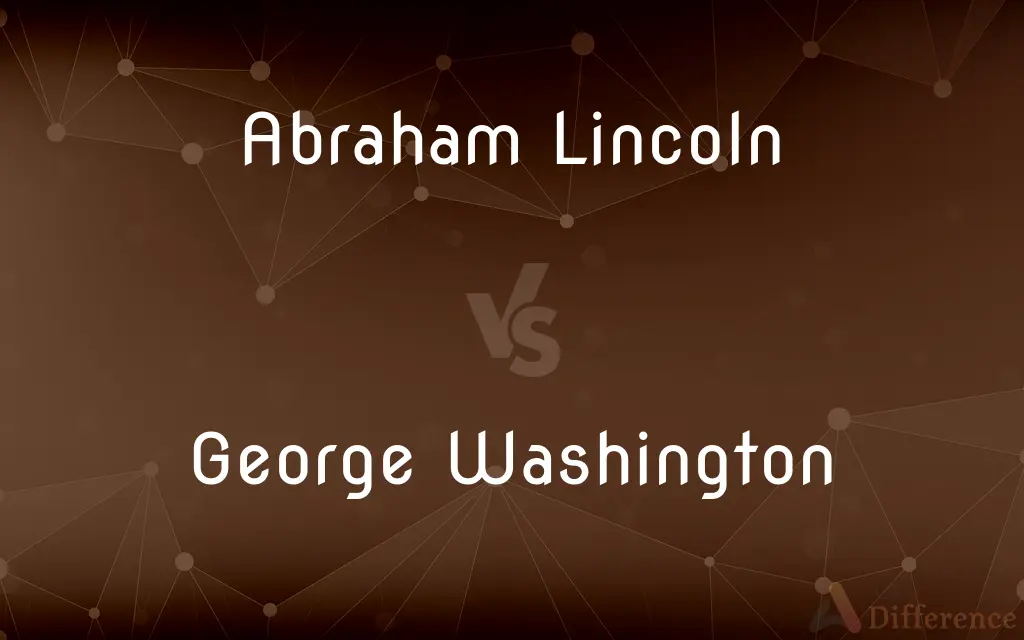Abraham Lincoln vs. George Washington — What's the Difference?
By Maham Liaqat & Urooj Arif — Published on February 25, 2024
Abraham Lincoln, the 16th president, led the U.S. through the Civil War, emphasizing the abolition of slavery. George Washington, the 1st president, was a Founding Father and the Revolutionary War leader, who established a stable national government.

Difference Between Abraham Lincoln and George Washington
Table of Contents
ADVERTISEMENT
Key Differences
Abraham Lincoln and George Washington are two of the most revered figures in American history, each playing pivotal roles during critical periods. Lincoln, serving as president from 1861 to 1865, is best known for his leadership during the Civil War and his efforts to abolish slavery, culminating in the Emancipation Proclamation. Washington's presidency, from 1789 to 1797, followed his role as the commander-in-chief of the Continental Army during the American Revolutionary War, with his presidency laying the groundwork for the newly established United States government.
Lincoln's presidency is marked by his dedication to preserving the Union and his belief in the moral wrongness of slavery, which led to significant social and political shifts in the United States. His Gettysburg Address and the passage of the 13th Amendment, which abolished slavery, are highlights of his commitment to human rights and equality. In contrast, Washington's presidency focused on the formation of a strong federal government, setting precedents such as the two-term limit for presidents and the creation of the first Cabinet.
Both presidents faced immense challenges, while their leadership styles were notably different. Lincoln's approach was characterized by his moral conviction and ability to communicate complex ideas in a way that was accessible to all Americans. Washington, on the other hand, was known for his stoicism, integrity, and unwavering commitment to republican values, which earned him the unanimous respect of his contemporaries.
Another contrast between the two is their backgrounds and rise to prominence. Washington was a Virginia plantation owner and a military officer before his presidency, which gave him a significant public profile and leadership experience. Lincoln, from a more humble background, was a self-taught lawyer who gained national attention through his debates with Stephen Douglas and his eloquent speeches on the issue of slavery.
Despite their differences, both Lincoln and Washington are celebrated for their leadership during times of national crisis and their contributions to the principles of democracy and freedom. Their presidencies are benchmarks in American history, demonstrating the impact of strong leadership on the country's development and the enduring legacy of their visions for the United States.
ADVERTISEMENT
Comparison Chart
Presidency
16th President (1861-1865)
1st President (1789-1797)
Key Achievements
Led the U.S. through the Civil War, abolished slavery (13th Amendment), Emancipation Proclamation
Led the Revolutionary War, established many governmental precedents, Farewell Address, Judiciary Act
Leadership Style
Emphasized moral conviction, accessible communication
Stoic, integrity-driven, prioritized republican values
Background
Humble beginnings, self-taught lawyer
Plantation owner, military leader
Main Challenges
Civil War, slavery, national unity
Establishing a stable national government, setting precedents, foreign policy
Notable Speeches/Docs
Gettysburg Address, Lincoln's Second Inaugural Address
Farewell Address
Impact on Slavery
Abolitionist, abolished slavery
Owned slaves but freed them in his will, presided over a country that allowed slavery
Compare with Definitions
Abraham Lincoln
Faced opposition for his anti-slavery stance but remained committed to equality.
Lincoln faced considerable opposition from pro-slavery factions, yet he remained steadfast in his commitment to abolition.
George Washington
Owned slaves but freed them in his will, reflecting the complexities of his time.
Washington's will, which freed his slaves, highlights the complex views on slavery among the Founding Fathers.
Abraham Lincoln
Assassinated in 1865, his legacy includes the promotion of freedom and equality.
Lincoln's assassination in 1865 shocked the nation, but his legacy of freedom and equality endures.
George Washington
His leadership during the Revolutionary War established him as a national hero.
Washington's strategic acumen during the Revolutionary War was crucial to America's victory.
Abraham Lincoln
The 16th President of the United States, known for leading the country through the Civil War and abolishing slavery.
Abraham Lincoln's Emancipation Proclamation was a pivotal step towards ending slavery in the U.S.
George Washington
Known for his integrity and republican values, Washington refused a third term.
Washington's decision to refuse a third term established the precedent for a two-term presidency.
Abraham Lincoln
Lincoln's leadership preserved the Union during its greatest crisis.
Under Lincoln's leadership, the Union was preserved following the Civil War.
George Washington
The first President of the United States and a Founding Father, Washington set many key precedents for the nation.
George Washington's Farewell Address offered timeless advice on foreign policy and national unity.
Abraham Lincoln
Renowned for his eloquence and moral conviction, particularly on the issue of slavery.
Lincoln's Gettysburg Address remains one of the most powerful speeches in American history.
George Washington
Washington's presidency laid the foundation for the U.S. government.
The structures and processes established during Washington's presidency remain core to the U.S. government.
Common Curiosities
How did Lincoln and Washington's backgrounds influence their presidencies?
Washington's military and leadership experience shaped his presidency's focus on stability and governance, while Lincoln's self-educated background informed his approach to leadership and communication.
Which president is more widely regarded for their impact on American democracy?
Both are highly regarded, but for different reasons: Washington for establishing the presidency and Lincoln for preserving the Union and abolishing slavery.
How did Lincoln and Washington handle their presidential powers?
Washington set precedents for presidential restraint, while Lincoln was noted for his use of executive power during the Civil War.
How did their leadership styles differ in facing national crises?
Washington's leadership was characterized by his steadiness and establishment of government precedents, while Lincoln's was marked by his moral leadership and decisive actions during the Civil War.
Were Lincoln and Washington universally admired during their presidencies?
Both faced significant opposition and challenges during their presidencies, but their leadership and decisions have been widely celebrated in history.
Who served as president during a more critical period of American history, Lincoln or Washington?
Both served during critical periods: Washington in the nation's founding and Lincoln during its greatest internal conflict.
How did each president contribute to the shape of the United States government?
Washington's presidency established the framework of the government, while Lincoln's preserved the Union and set the stage for significant social changes.
Did Lincoln and Washington share similar views on slavery?
Their views and contexts differed significantly; Lincoln actively worked to abolish slavery, while Washington's actions were more complex, reflecting his era's norms.
What were Lincoln and Washington's most famous speeches?
Lincoln's Gettysburg Address and Second Inaugural Address; Washington's Farewell Address.
What are the lasting legacies of Lincoln and Washington?
Washington's legacy includes the establishment of a stable democratic government, and Lincoln's includes the preservation of the Union and the abolition of slavery.
Share Your Discovery

Previous Comparison
Orange Juice with Pulp vs. Orange Juice without Pulp
Next Comparison
Dell Optiplex vs. HP ElitedeskAuthor Spotlight
Written by
Maham LiaqatCo-written by
Urooj ArifUrooj is a skilled content writer at Ask Difference, known for her exceptional ability to simplify complex topics into engaging and informative content. With a passion for research and a flair for clear, concise writing, she consistently delivers articles that resonate with our diverse audience.
















































